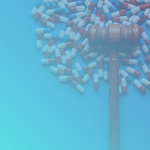
“Magic mushrooms” have been used for centuries for healing, religious, and spiritual purposes. But after being “unfairly” stigmatized in the US during the 1960s counterculture politics and later outlawed, magic mushrooms seem to be making a comeback.
There is growing evidence that “magic mushrooms” could be instrumental in treating mental and behavioral health issues. Recent studies show that psilocybin, the psychedelic substance found in the so-called magic mushrooms, could revolutionize the world of mental health treatments.
Apparently, classic psychedelics like psilocybin and LSD can help “rewire” the brain in ways that could play a role in long-term recovery from severe psychological and behavioral health issues like anxiety, depression, addiction, and post-traumatic stress disorder when used under supervision.
“…rather than just masking a symptom, it allows you to go and look at the cause of the problem and figure out the best way to address that moving forward,” said Eric Gaden, a veteran and nurse – who testified in front of Washington lawmakers in favor of psilocybin legalization.
Currently, psilocybin is a Schedule I drug, meaning it is illegal in the United States. But this might soon be a thing of the past. There is a growing wave of support for decriminalizing magic mushrooms, and lawmakers are starting to take notice.
In 2020, Oregon voters passed a ballot initiative to legalize the supervised use of psilocybin for therapeutic purposes. This move has since become a pacesetter, with multiple legislative proposals seeking to legalize psychedelics or facilitate psychedelic research popping up in Connecticut, California, Utah, New Jersey, Texas, Missouri, and New Jersey.
Surprisingly, what has been viewed as a taboo and fringe issue for decades is quickly gaining mainstream traction and most of the legislative proposals are receiving unanimous, bipartisan support at the preliminary stages.
In mid-march, Connecticut’s Public Health Committee unanimously approved a bill looking to legalize and provide funding for a pilot program that will give “qualifying” patients access to psilocybin- and MDMA- assisted therapy. A similar bill seeking to grant universities and research institutions in Oklahoma the right to conduct psilocybin research also received similar support from the state’s Public Health Committee.
Recent polls, including one conducted in D.C. by FM3 Research, have divulged that an overwhelming majority of voters would be much more likely to vote for leaders who embrace drug policy reforms. By the looks of things, the same playbook that was used to legalize and destigmatize cannabis is in play again, this time in favor of the “magic mushrooms” and other psychedelic substances. Lawmakers and members of the public are slowly but surely coming around to the idea that these psychedelic substances have immense medicinal value.
And with more studies and clinical trials showing evidence of their efficacy, everything seems to be moving on a positive path, and it’s only a matter of time before more and more states follow in the footsteps of Oregon. The FDA has also described psilocybin as a breakthrough treatment, a designation that carries plenty of promise.
However, not everyone is on board with the idea of legalizing psychedelics. Some have chosen to tread carefully, while others have rebuffed the idea. For instance, the State of Washington decided to shelve a bill that, if enacted, would have legalized supervised use of psilocybin by adults above 21 years of age. Instead, the state lawmakers allocated a substantial budget to psilocybin research and how to effectively implement a legal psilocybin treatment program.
On the other hand, the U.S. House of Representatives has, on two occasions, rebuffed an amendment tabled by New York lawmaker Rep. Alexandria Ocasio-Cortez (D) that sought to get rid of “old” laws that restrict psychedelics research.
So it would seem that we are still in the early stages of what might prove to be a protracted battle to legalize and destigmatize the use of psychedelic substances for medicinal purposes.
But with more support and positive evidence, it seems inevitable that at some point in the near future, psilocybin and other psychedelics may be legally available for the treatment of severe and life-threatening behavioral and mental health disorders in most states, at the very least.


No comment yet, add your voice below!